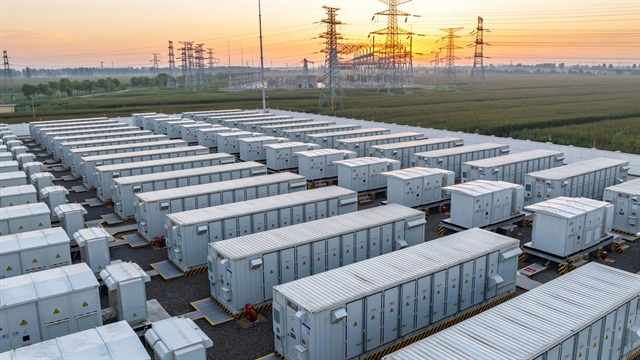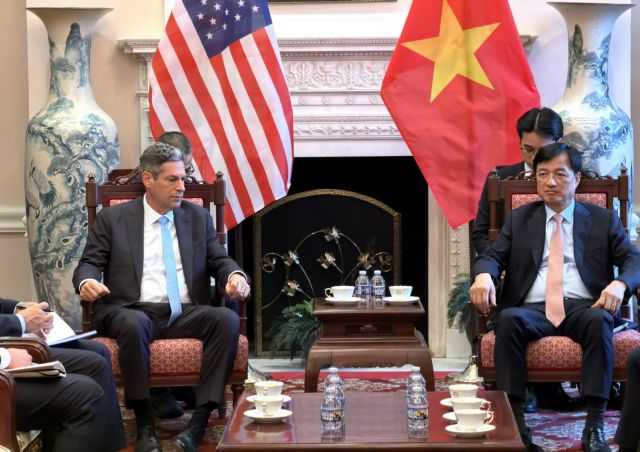 Business Beat
Business Beat


|
| Rising interest in energy storage systems in Việt Nam. — Photo ecosolar.vn |
Compiled by Thu Trà
HÀ NỘI — Việt Nam’s solar and wind sectors are expanding rapidly, but experts warn that without large-scale battery storage, fully harnessing the country’s abundant renewable electricity remains a distant dream.
The battery energy storage systems (BESS) are no longer viewed as auxiliary equipment but as a core component of the clean-energy ecosystem. The technology enables the storage of renewable electricity, stabilises grid frequency, eases transmission congestion and smooths peak and off-peak loads. For businesses, these capabilities translate into lower operating costs and a higher share of on-site green power.
According to Đào Hoàng Duy, Deputy General Director of Sales & Marketing at GG Industries, a manufacturer of energy storage systems, Việt Nam’s hundreds of industrial parks — many linked to global supply chains — face mounting pressure to adopt clean energy and cut emissions.
Solar and wind power are inherently unstable — only battery storage allows companies to secure a reliable electricity supply, he told saigontimes.vn.
Duy noted that Việt Nam’s three-tier electricity tariff provides a strong incentive for BESS adoption, as off-peak rates are roughly one-third of peak-hour prices. Once the direct power purchase agreement (DPPA) mechanism comes into effect, a solar power plus BESS model could enable companies to meet their own green-energy needs and even sell surplus electricity within industrial parks.
At the start of 2024, BESS was still a new concept. But in the past six months, Duy said his company has consulted more than 200 businesses, highlighting the strong interest. Yet market growth remains constrained by legal uncertainties, leaving many companies unsure where to begin.
Regulatory confusion
Confusion over BESS investment extends beyond businesses to local authorities.
Phan Văn Dũng from Phú Thọ Province's Department of Industry and Trade said many consulting units and businesses have approached his department for guidance, but it lacks a regulatory framework.
He told saigontimes.vn that total BESS capacity is determined centrally but not allocated to localities, preventing departments from processing project applications.
Uncertainty over whether BESS projects should be classified as energy infrastructure or auxiliary equipment further complicates matters. Even small projects must navigate adjustments to land-use planning and investment approvals — a lengthy process, Dũng said.
Echoing Dũng’s concerns, Trần Văn Hợi from Anh Duong Power Co in HCM City said interpretations vary by locality.
Enterprises spend months obtaining construction permits, fire safety approvals and technical appraisals. While the technology evolves rapidly, the procedures remain too slow, he said.
Hợi proposed national standards for BESS systems, covering design, safety and fire prevention, to provide local authorities with a unified reference framework.
Market and financial hurdles
Nguyễn Anh Tuấn, vice president of the Vietnam Energy Association, identified the lack of a market mechanism for BESS as the biggest bottleneck.
There is no payment system for ancillary services, no valuation of the difference between storage and generation and no clear bidding process, Tuấn said, adding that without visible cash flow, businesses are reluctant to make large investments.
Investment costs also remain high, with battery cells and modules accounting for 85 per cent of total system value. For small and medium-sized enterprises, building a BESS facility can be a major financial burden. Many banks also do not accept BESS assets as collateral, limiting access to green financing.
Duy from GG Industries petitioned the State to recognise the value of BESS assets to develop the BESS market.
Once a legal framework exists, banks will lend and businesses will invest, Duy told an online newspaper.
Other challenges include complex grid integration and environmental concerns related to battery recycling and disposal, industry insiders said.

|
| VinFast Energy launches commercially operated BESS at Vinpearl Resort Nha Trang. — Photo courtesy of VinFast |
Initial steps into the sector
At the Việt Nam-China-ASEAN International Energy Forum 2025, T&T Group’s Deputy CEO Nguyễn Thị Bình said battery storage was still a high-barrier field.
Global competitors, especially in China, had a decade-long lead in technology and scale, while Việt Nam currently lacked domestic manufacturers, she said.
Bình said local production, supported by government incentives, could help level the playing field. T&T’s vision was to build Việt Nam into a manufacturing and technology hub for renewable energy equipment, especially in the green industrial parks being developed under government planning.
"I believe the Government will strongly encourage locally produced storage batteries, especially those invested in by Vietnamese investors, and there will certainly be supportive and preferential mechanisms to enhance competitiveness in the market,” she said.
T&T plans to launch joint-venture battery storage products in 2026, starting with 2GWh annual production and scaling up to 10GWh within three years. This initiative is intended to meet anticipated demand once pricing and installation regulations are clarified.
Meanwhile, Marubeni Corporation, via its subsidiary Marubeni Green Power Việt Nam, has entered the battery storage sector with a demonstration project in partnership with Vingroup.
A VinFast Energy-developed BESS was installed at a Vingroup resort to reduce electricity costs by leveraging time-of-use rate differences — one of the first such business models in Việt Nam. — VNS




